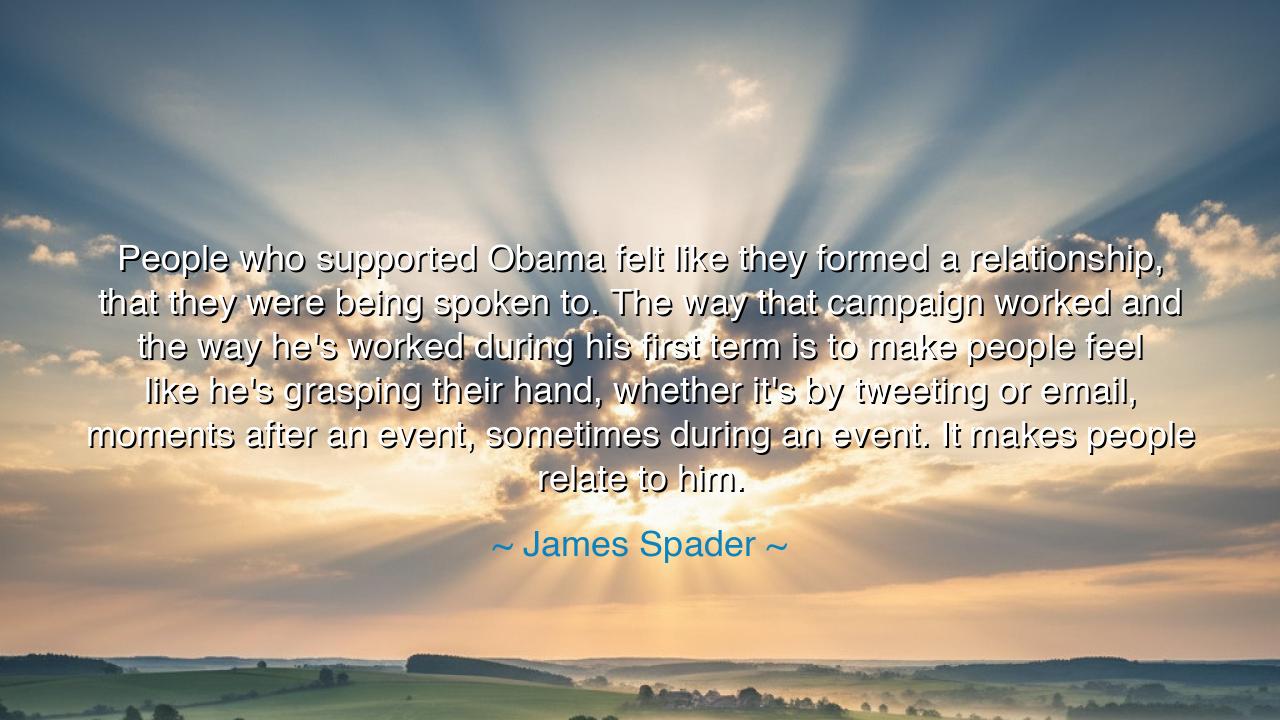
People who supported Obama felt like they formed a relationship
People who supported Obama felt like they formed a relationship, that they were being spoken to. The way that campaign worked and the way he's worked during his first term is to make people feel like he's grasping their hand, whether it's by tweeting or email, moments after an event, sometimes during an event. It makes people relate to him.






The words of James Spader—“People who supported Obama felt like they formed a relationship, that they were being spoken to. The way that campaign worked and the way he's worked during his first term is to make people feel like he's grasping their hand, whether it's by tweeting or email, moments after an event, sometimes during an event. It makes people relate to him.”—capture the profound transformation of leadership in the modern age. They remind us that power does not dwell only in speeches, policies, or institutions, but in the unseen bonds between leader and people, in the art of making multitudes feel as though they are touched personally, heard directly, and valued as individuals.
When Spader speaks of a “relationship” between Obama and his supporters, he calls attention to the essence of trust in leadership. In ancient times, kings sought loyalty through grandeur and fear, standing apart from their subjects. But true loyalty comes not from distance, but from closeness—from the sense that a leader walks beside his people, rather than towering above them. Obama’s use of words, his mastery of connection through new tools of communication, became a way of grasping the hand of millions at once, reducing the chasm between ruler and ruled.
The ancients, too, understood this truth. Julius Caesar, though a man of power and conquest, knew how to win the hearts of soldiers by calling each by name, by sharing their meals, by walking through mud alongside them. Alexander the Great was said to fight in the front lines, covered in dust and sweat, so his warriors felt not abandoned, but united. Their strength was not only in their armies but in their ability to inspire the feeling of relationship—that each soldier was personally tied to the leader’s vision and fate.
Spader also points to the use of modern tools—tweets, emails, immediate responses—that became symbols of intimacy between leader and people. Though separated by distance, the act of communication in near-real time created the illusion of presence, as if the president himself reached into each supporter’s home. In the past, such intimacy might be fostered through letters or speeches delivered in town squares. In this age, technology became the new medium of connection, echoing the timeless human need to be seen and heard.
The meaning of Spader’s words, then, is that leadership is not only about command, but about relatability—the ability to make vast crowds feel like a single circle of friends, to make individuals in a multitude feel as though their hand is held. A leader who masters this art is not worshipped from afar, but embraced as kin. The power of Obama’s campaign and early presidency was not simply policy, but presence—the weaving of invisible threads of belonging.
History teaches us what happens when leaders fail to form such bonds. The last kings of France, who hid themselves in gilded halls, saw their people starve and rage until the monarchy was torn down. The Soviet leaders, distant and untouchable, surrounded by walls of propaganda, lost the love of their people and watched their empire collapse. In contrast, those who create bonds of trust and relatability endure in memory, for their people feel not ruled but accompanied.
For us, the lesson is clear: whether one leads a nation, a household, or a team, connection is strength. Speak in ways that make others feel seen, and act in ways that make them feel valued. Use the tools of your age—be they words, gestures, or technologies—to close the distance between yourself and those you guide. Do not rely on authority alone; authority without relationship becomes brittle. Instead, cultivate closeness, for a hand grasped in honesty is stronger than a crown worn in isolation.
The practical action is this: practice listening, practice reaching out, and practice responding swiftly and sincerely. When you lead, do not build walls of silence, but bridges of communication. Let people feel that you stand beside them, that you share their burdens and hopes. For in this lies the deepest wisdom of Spader’s words: a leader endures not because he rules, but because he relates. And in that sacred bond between hand and hand, the power of unity is born.






AAdministratorAdministrator
Welcome, honored guests. Please leave a comment, we will respond soon